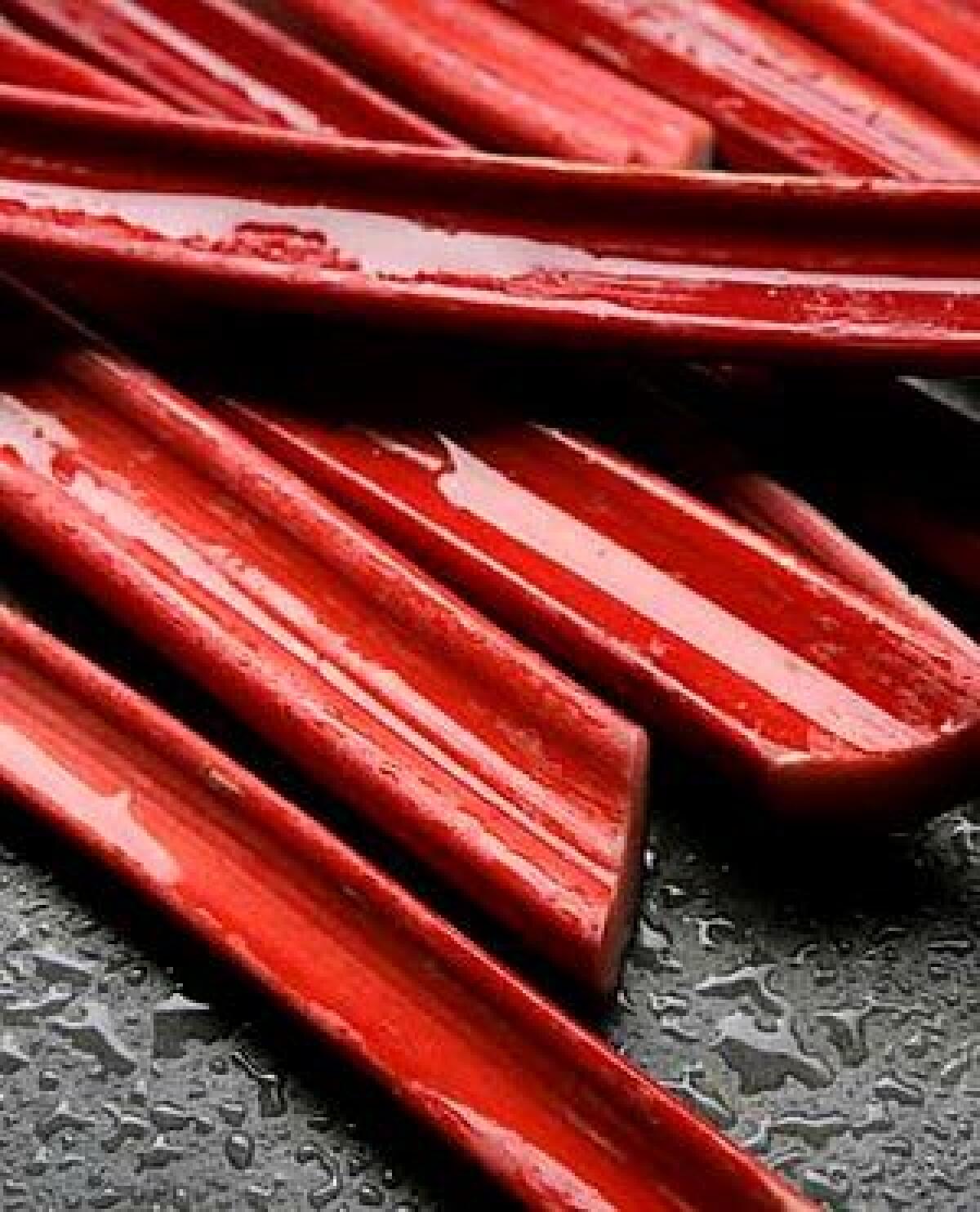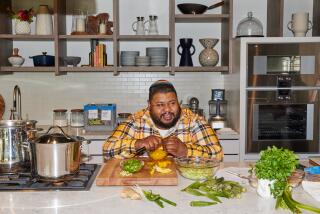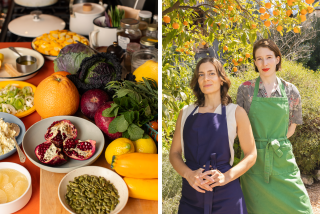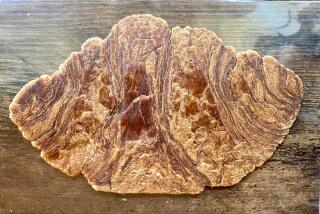The sweet side of rhubarb

WE PUT IN A NEW front yard a couple of weeks ago, complete with drought-tolerant plantings, decomposed granite walkways and a “water feature” (apparently, nobody says “fountain” anymore). Of course, there’s an edible component: four raised vegetable beds for growing tomatoes, squash, melons and greens, as well as two trees -- a Fuyu persimmon and a Panachée fig.
But the thing I may be most excited about is that with any luck, by this time next year I’ll be cooking from my own rhubarb plants.
My excitement will perplex some people. Rhubarb seems to have a large and very vocal collection of detractors. For lots of folks, the idea of intentionally planting rhubarb, of actually wanting to have more of it, is insanity.
That disappoints but doesn’t surprise me. Strong character will always be divisive. Only the bland is universally popular.
And rhubarb is definitely anything but bland. It is tart in the extreme, to the point of astringency. Chew on a chunk of raw rhubarb stalk and you might come away gasping (I actually like to do this occasionally -- almost like a good wake-up jolt to the palate -- but I admit that’s odd even among rhubarb lovers).
However, cook rhubarb with sugar and that sourness balances the sweetness in a compelling way. At the same time, the plant’s tough, fibrous texture melts into silkiness.
In fact, so fragile does rhubarb become that you should be very careful when cooking it to keep from tearing the stalks to shreds. Shake the pan, don’t stir it.
Because rhubarb needs to be cooked to become palatable, it has traditionally been called the “pie plant.” Indeed, rhubarb is spectacular in pies. But it is also grand in cobblers, crisps, compotes and fools, either by itself or in combination with other fruits.
Strawberries welcome
OF course the classic pairing is rhubarb and strawberries. This works on a couple of levels. Strawberries by themselves can be sweet but a little insipid -- particularly with the varieties most widely planted these days. The addition of rhubarb lends depth and balance.
As a food-geek side note, the pairing of rhubarb and strawberry also makes an interesting chemistry lesson -- one with delicious overtones. Anthocyanin, the pigment that makes strawberries red, is not heat stable, so when the berries are cooked, they usually turn an ugly shade of purple, kind of like a bad bruise.
But the acidity that makes rhubarb so tart also stabilizes anthocyanin, so the berries’ color remains a bright, clear red after cooking.
Don’t feel restricted by the old pie-crisp-cobbler mold. Rhubarb and strawberry puréed together make a strikingly colored and perfectly balanced sorbet. Or twist the pairing in a slightly different way by serving a rhubarb crisp with a lovely, simple sauce made with uncooked strawberries.
Rhubarb and cherries make another nice combination. There’s no chemistry behind this; it just tastes good. And orange is a good flavor partner too. Whether added in the form of juice or zest (or both), it seems to round out the flavor of rhubarb in a way that lemon or other citrus fruits can’t.
Make a compote by gently stewing rhubarb in its own juices along with grated ginger. These are two big, very different flavors and it’s the gently sweet and sour taste of orange juice that bridges them.
This is wonderful when served as a balance to richly flavored duck breast. It would be equally good served with roast pork. And it would be absolutely grand with some sautéed foie gras, should you happen to find yourself in the happy situation of possessing some.
When cooking rhubarb, remember that as assertive as the stalk is when raw, the flavor tames quickly. Poach it in a little simple syrup and in less than 10 minutes you’ll have a lovely pink fruit so delicate you may not recognize it.
Don’t use too much syrup or you’ll hardly taste the rhubarb. If you want it to retain more character, macerate your rhubarb in sugar to draw out some of its juice, and then cook it gently in that.
The more you think about it, the more ways you’ll probably find to serve rhubarb. In fact, you may find that the biggest problem is finding enough stalks to cook everything you want.
Hard to find
THAT’S because in Southern California, rhubarb can be scarce. This is partly because there’s just not a lot of demand. After all, when you’re knee-deep in spring citrus and strawberries, it may be hard for some folks to get excited about rhubarb.
But not me. A couple of weekends ago, desperate for some stalks, I visited five stores before finding any. Farmers market regular ABC Rhubarb used to grow the plant in Downey, but gave up a few years ago because of lack of demand (they still use the name, even though most of what they sell today is fresh herbs -- and very good ones).
The other reason it’s hard to find is that unlike almost every other fruit or vegetable, there’s not a lot of it grown in Southern California. Rhubarb does best where it gets cold; the plant needs occasional winter temperatures below 40 degrees to be reliably productive on a commercial scale. Almost all of the farming of rhubarb in the United States -- all 1,500 acres of it -- is done in Washington and Oregon.
There are two separate harvests. The first, which runs from mid-winter until early spring, comes from hothouses. Right about now, field-grown rhubarb starts to show up and will last for about a month. This rhubarb is usually more deeply colored and slightly denser in texture than the hothouse.
A bit of a gamble
Irealized when planting my rhubarb that those temperature requirements make it something of a gamble. Some experts recommend treating it as an annual, to be replanted every year or so. Yvonne Savio, who runs Los Angeles County’s Common Ground Garden Program, says she’s tried growing rhubarb twice, and each time the plant lasted two or three years (in cold climates, it’ll go at least 10).
Still, she seemed very satisfied with the number of pies she made even with that shorter life span.
And one of my neighbors is a crotchety old bachelor from the Midwest who periodically brings over stalks he’s cut from the plants he’s maintained for years in his backyard garden.
Come to think of it, the man and his fruit share a certain resemblance: tart, even acerbic, but with a sweet side when handled properly.
And who knows, in a few years, after my new front yard grows in, maybe that’s what some smart-aleck writer will say about me. There are worse things to be compared to than rhubarb.
More to Read
Sign up for our L.A. Times Plants newsletter
At the start of each month, get a roundup of upcoming plant-related activities and events in Southern California, along with links to tips and articles you may have missed.
You may occasionally receive promotional content from the Los Angeles Times.







